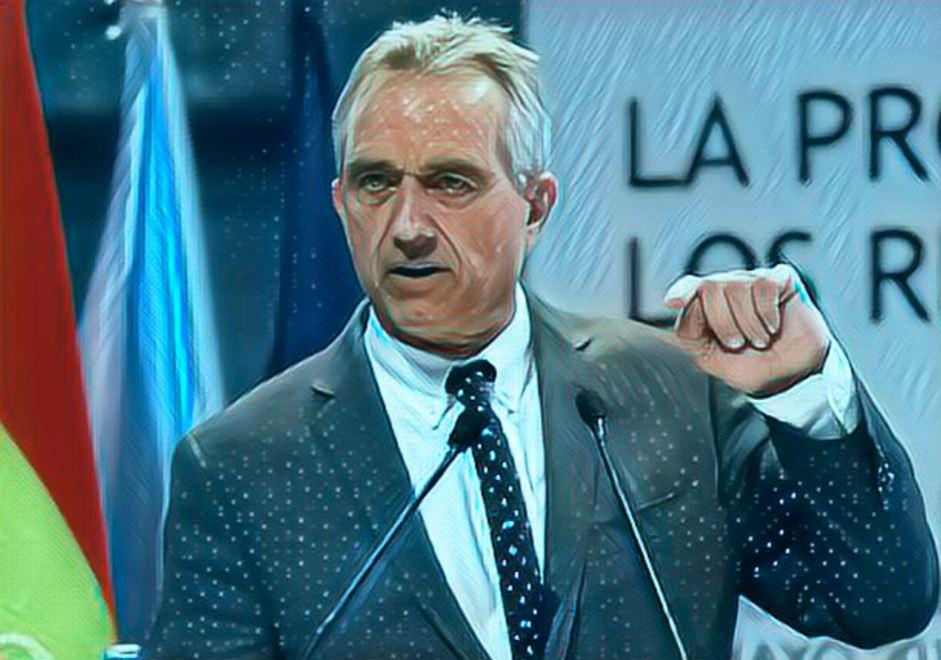The 2004 presidential election was stolen: Kennedy Jr. said in a 2006 Rolling Stone article he was “convinced” that voter fraud in the 2004 presidential election allowed former Republican President George W. Bush to steal the victory from Democrat John Kerry, but while a 2005 postmortem by the Democratic Party found a breakdown of the election system in Ohio, it found no evidence of fraud.
Robert F. Kennedy Jr: The 2004 U.S. presidential election was stolen or rigged in favor of Republican candidate George W. Bush:
- In 2006, he published an article titled “Was the 2004 Election Stolen?” which questioned the results and suggested evidence of election irregularities and possible fraud in Ohio that favored Bush over Democrat John Kerry.
- He has cited statistics about vote discrepancies in Ohio, issues with electronic voting machines, voter suppression, and discrepancies between exit polls and final results as reasons to suspect the 2004 election was manipulated.
- Kennedy has specifically claimed Republicans engaged in voter suppression tactics aimed at minority groups who were more likely to vote Democrat in key swing states like Ohio.
- He contends there was political interference in vote counting and a lack of adequate investigation into alleged irregularities after the fact.
- In 2008 media appearances, Kennedy continued to argue that cheating and suppression distorted the 2004 election results.
- He suggested some of the issues in 2004 were worse than the controversial election between Bush and Al Gore in 2000.
- However, Kennedy acknowledges that providing definitive evidence of a stolen election is very difficult. But he remains suspicious of the 2004 result based on the alleged anomalies.
- Beyond Ohio, Kennedy pointed to then-Florida Secretary of State Glenda Hood, who he accused of using purged felon lists to suppress Democratic votes. Hood denied this.
- He suggested the Bush family historically engaged in “ballot-tampering” going back to the 1930s. Some historians argue this claim relied on questionable evidence.
Kennedy put forward a whistleblower named Clint Curtis who claimed he was asked by GOP operatives to design vote-rigging software. Curtis’ claims were later undermined during testimony. He has continued asserting that 2004 marked one of the most “blatant” abuses of democratic processes in U.S. history. But he could not convince Kerry to act on it.
In recent years, Kennedy has not focused as heavily on his 2004 stolen election theory. But he uses it to argue America’s elections lack sufficient safeguards for integrity and transparency. So while Kennedy stands by his assertions, they did not gain decisive proof or traction. The theories ultimately languished after peaking around 2006.
So in summary, yes Robert F. Kennedy Jr. has been a prominent voice accusing Republicans of stealing or rigging the 2004 presidential election to re-elect George W. Bush, though he admits concrete proof is elusive. He wrote and spoke extensively about this viewpoint in the mid-2000s.
Did President George Bush respond to RFK Jr’s allegations of conspiracy in the 2004 election?
George W. Bush himself did not make extensive public comments directly addressing the allegations that the 2004 election was rigged in his favor. However, his spokespeople and Republicans did respond:
In 2005, Bush White House spokesperson Scott McClellan dismissed claims of 2004 election fraud as “conspiracy theories” not supported by evidence. He asserted Bush’s victory was “confirmed by objective news sources.”
Bush’s campaign advisor Karen Hughes called allegations of rigging “offensive” and suggested Democrats were being sore losers. The Bush team maintained confidence in the certified election results.
Republican National Committee Chair Ken Mehlman argued in 2005 that investigation requests were “silly” and there was “no credible evidence” of deliberate fraud that altered the outcome.
Bush’s Secretary of State during the 2004 election, Colin Powell, stated in 2005 he saw no significant issues of fraud raised after extensive examination of results.
In 2007, Bush spokeswoman Dana Perino reiterated the administration’s position that “no credible evidence” of significant wrongdoing was ever presented after multiple investigations.
When asked directly about claims of conspiracy in 2004, Bush typically gave vague responses about the importance of election integrity without affirming or denying specific allegations.
- Exit poll discrepancy: Some skeptics pointed to discrepancies between exit polls and actual results in Ohio and other key states as evidence of fraud. However, research suggests the exit polls were flawed.
- Vote flipping: Some claimed electronic voting machines “flipped” votes from John Kerry to George W. Bush due to tampering. But multiple investigations found no evidence of widespread vote flipping.
- Diebold conspiracy: Due to some of their executives supporting Bush, voting machine company Diebold was accused of rigging machines. However, Diebold machines weren’t even used in Ohio.
- Stolen votes: The claim that over 300,000 Ohio votes were stolen or lost was circulated. But independent investigations found no evidence to substantiate this allegation.
- Ukraine connection: Some theorized that the 2004 Ukrainian presidential election fraud conspiracy was connected to the U.S. election. But the two situations were very different politically and evidentially.
- One of the most circulated conspiracy films was “Ohio 2004” by filmmaker Richard Hayes Phillips. It claimed to have photographic evidence of vote mistabulations and fraud in Ohio. However, reviewers found the data cherry-picked and the conclusions unsubstantiated.
- Some analyzed election results and claimed that irregularities in vote counts and turnout pointed to manipulation of electronic voting machines. However, studies by institutions like MIT found these anomalies did not indicate fraud once contextual factors were included.
- The group Black Box Voting alleged that votes were illegally counted multiple times in Ohio. They filed lawsuits seeking access to ballot records, but were unable to uncover solid evidence backing their claims.
- Author Mark Crispin Miller wrote a book claiming that John Kerry actually won Ohio, alleging various kinds of fraud. But other analysts found his claims to be based on misinterpretations of data and unreliable evidence.
- Democrats in Congress pushed to challenge the Ohio results over allegations of irregularities. But the challenge was abandoned due to lack of concrete evidence and endorsement by Kerry himself of Bush’s certified victory.
- Some claimed that Republicans orchestrated long lines and shortages of ballots/machines in Democrat-leaning areas to disenfranchise voters. But studies indicated that precinct resources were not disproportionately allocated by party.
In summary, while there were anomalies, claims of a stolen election remain unproven. Multiple state recounts and independent investigations uncovered no significant evidence of fraud or vote rigging. The election results were certified.

